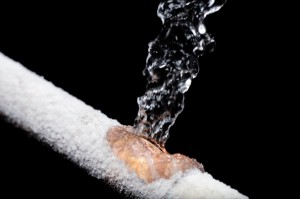Prevent Frozen Pipes
Put the freeze on frozen pipes! Every winter, homes are damaged by frozen water pipes. Burst water pipes are a major inconvenience, but prevention is simple. To prevent frozen pipes in your home, follow these tips:
- Disconnect garden hoses. If there is an indoor valve, shut off and drain the water supply to outdoor faucets.
- Eliminate drafts and repair any broken windows. Seal cracks in basement and crawlspace walls.
- Insulate pipes most susceptible to freezing. Typically, these are near walls closer to the outside, in crawlspaces, and in the attic. Wrap pipes in unheated areas with weatherproof insulation or heat tape.
- Make sure you and your family know the location of your home’s water shut-off valve. If a pipe bursts, shutting off the water promptly can help minimize damage.
Tips if a Bitter Cold is Predicted
- Let water flow, zero or below. Letting a thin stream of water run when the temperature remains below zero can keep your pipes from freezing. There will be no adjustment given on your bill for water used to prevent pipes from freezing. The repair charges for frozen pipes will cost you much more than the water used.
- If you’ll be away for several days, set the heat no lower than 55 degrees and turn off the water supply.
- If your pipes freeze, be careful of electric shock in areas of standing water.
- Don’t try to thaw a pipe with an open flame or torch.
- Open cabinet doors under sinks to allow air to circulate and prevent pipes from freezing in subzero weather.
Master Valve Location
Most likely locations for your master valve to be located include:
- Before or after the water meter
- Near the clothes washer hook up
- Near your water heater
- Where the water supply enters your home

